The first real sign within the Faculty of Medicine that showed me that we were starting to enter a dangerous arena was the cancellation of the 11th AIMS Meeting. We had been urgently called and there was talk of a teleworking hypothesis, at least in specific cases. From specific, they became majority cases. From the light-hearted way with which we affixed hand hygiene posters all over the Hospital, with only our hands protected, we quickly became afraid to enter a place that we often see as our first home. This was followed by news of more important cancellations of student activities and some initial complaints that we received through social media. A new emergency meeting, now with coordinators of all years, showed me that perhaps there was something more serious... The apparent calm of the Director who raised our awareness to the need to stop almost everything and the explanation of the President of the Pedagogical Council who, with all his team, had just implemented distance learning classes, emphasized more evidence which, nevertheless, we felt tempted to deny, as we do when we know we are going to lose someone. Then we asked until when we could stay in the Faculty. "At least until tomorrow to finish some payments?", someone asked. "No. We are facing a very serious pandemic that kills!”. Given that clear, half-worded warning, I realized that we were all going home. But I also understood that there would be consequences, the majority of which we had not begun to feel.
And how about the students? I asked myself while thinking about some people in particular. And those who are abroad, will they have to return? And those who should undergo an Erasmus mobility, will they not go anymore? And those who were at a hospital ward where an infected patient was, how are they? And those who have no family here, what will become of them? And all the teams that had everything organized for events, trips, year-long projects? What will happen to year 6 students who should be finishing their hospital internships and who need to be mentally prepared for the National Access to the Specialty Exam?
I wanted to talk with all of them, as it is not possible, I asked some of them to help me understand what they have been through and what doubts and emotions they are experiencing.
This is but a small sample, but it is a generous sample of students who agreed to talk without obstacles, barriers or modesty.
They are male and female students of different ages and with different responsibilities, some live far away, others are on mandatory quarantine, some have fragile grandparents while others faced interrupted paths. All believe that this is the way and that they will come out of it wiser, especially regarding their human side. What do our students feel about this pandemic? I asked them to tell me, in their own words.
Thank you all very much.
We are all together!
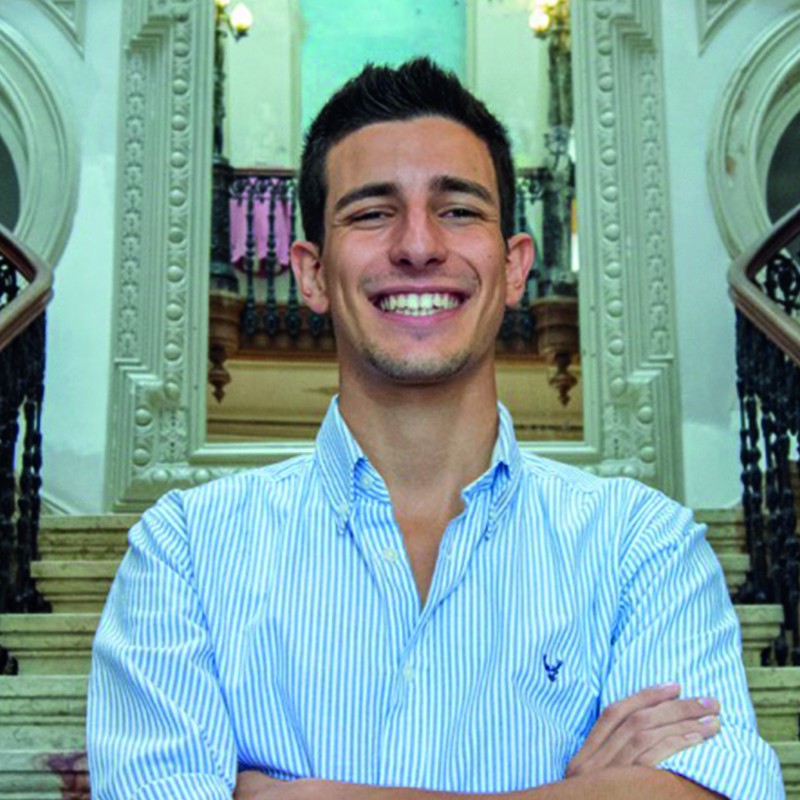
Guilherme Vilhais - year 5 of the IMDM – General Coordinator of the 11th AIMS Meeting
“Sometimes, the journey matters almost as much as the destination”
The semester had just begun and there was much to discuss, take stock of the situation, details to be completed and several major last decisions to be made. We were 100% focused once the Exams and the Electives were out of the way. We set up a General Meeting with the entire Organizing Committee, symbolically on the day when the 11th AIMS Meeting was precisely one month away. We discussed what we had to discuss, decided what we had to decide and, at the end of the meeting, I decided to share a concern that had arisen in the past few days: "Do you think this situation of the Coronavirus can affect us in any way?" - I asked with the naivety of someone who had no idea of what was coming.
The days went by. We were on count down, and the situation was escalating. The virus had arrived to Europe and the worries began, little by little, to be part of our daily life. But the plan was to continue, anticipate scenarios and try to find solutions. We would have to adapt, if required. We started, preventively, to seek advice and information.
And then the day came when everything really changed. The virus had arrived in Portugal, without clarifying the possible consequences of its arrival. I think that from that moment on everything happened very fast. While some continued to prepare everything as if it nothing would happen, we made many requests for advice. The first emails and calls also began to arrive. Participants, partners, speakers and sponsors questioned whether, in light of the new developments, everything would continue as planned and our answer to them was that we were monitoring the situation. The first institutional recommendations ensued, and they were clear: scientific or other meetings which, due to the involvement of international participants or to the high number of participants, could constitute a risk of outbreaks should be avoided. The situation appeared to be more serious than we had initially anticipated. This was not just another flu and the hours that followed were restless, but above all filled with uncertainty. We fought, as we always did, for the Project we built for months of our lives, but in the most conscious way: seeking advice from those in the know. And finally, the moment came when the most difficult decision we ever had to make became unavoidable: the 11th AIMS Meeting would be cancelled. Writing today, in the light of what we have experienced in the last few days in our country, it is impossible not to put this whole situation in perspective. Of course, it directly affected our individual and team expectations, but it couldn't have been otherwise. This was followed BY a difficult period of deconstructing something that actually had cost a lot to build, leaving the feeling that all the potential generated would be unrealized. But in the midst of heartache and disillusion, prevailed the satisfaction of being on the right side of the battle, of having been allies in fighting this virus that is making us live unprecedented situations. Sometimes, the journey matters almost as much as the destination. Despite the many moments that will be postponed to an unknown future, there are memories, learning and friendship. It is also in the most difficult moments that we receive the most comforting and unforgettable demonstrations of support, so I cannot help but thank everyone who, in addition to helping us to build this edition, brought us the words that, not ending with sadness, reminded us why each hour invested was worth it. To the participants, I guarantee that the AIMS will return to fulfil its full potential and with the irreverence, professionalism and relevance to which we have become accustomed.
Finally, I cannot fail to express my greatest thanks to the 23 incredible people with whom I had the opportunity to share this journey, who taught me so much and made me develop. I also thank the Management and Treasury Department of the AEFML for having always been on the same side as members of the same team. And what team!
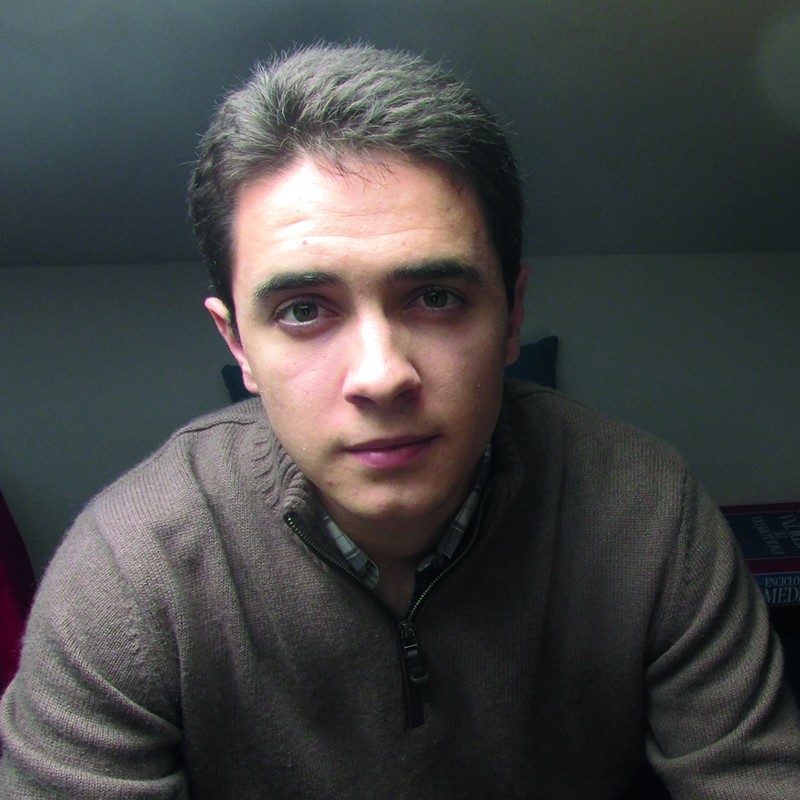
Rafael Terceiro – Year 3 of the IMDM and cadet at the Naval School
“The Navy teaches us that, at sea, regardless of whether we are sailors, corporals or officers, we are all in the same boat”
This pandemic completely changed my life as a medical student and a cadet at the Naval School. As a medical student I am used to being in contact with the lecturers, colleagues and employees, something that I consider to be an asset, because we learn every day from the experiences of others and are in contact with people who help us overcome the adversities of everyday life. The practical classes are a great source of learning as we are in contact with a lecturer who, in addition to teaching us the theoretical part, also shares experiences of the profession, which in the theoretical classes we now have access to does not happen.
As a cadet at the Naval School, contact with our comrades is part of our daily lives, since we sleep in dormitories, we have our meals together in the mess and we take the same transport, every day of the week.
This absence adds to the absence of contact with the people who cook our dinner, transport us daily to the university and who make an enormous effort to ensure that we experience a “taste of home”. These daily contacts are something that no online platform can replace and they represent a big part of our life.
I think this crisis has an impact on people's lives in more ways than we imagined. I hope that with this situation, we can all highlight and value the things that we take for granted. There are few things we can take for granted in life and this crisis has highlighted how, in just a few days, everything can change. We are facing a war, but we cannot fight it with firearms. We fight it with competent citizens, with health professionals who work tirelessly, and with everyone who strives so that, at the end of the day, we can be with our family having dinner.
I would also like to highlight the role of the Army in this struggle through their support to the Civil Authorities and the NHS. In addition to the crucial role in the defence of Portuguese territory, they are also present in emergency situations, namely in the area of health. Regarding this support, I would like to quote the key ideas of the message that the Admiral Chief of Staff of the Navy and the National Maritime Authority addressed to all military personnel regarding this mission: We must be cohesive, calm, ready and supportive” and “The Navy and the NMA continue to support the national effort to combat the pandemic crisis to the maximum extent of their capabilities and competences”. One of the biggest impediments, as I mentioned, is the absence of contact with people and that makes us value their presence more. They help us develop as people and students because there is a sharing of knowledge that is only possible through living together. The "good morning" that we say to the driver, to the canteen workers, to the library staff, to family, friends and comrades is part of a routine that we create and that becomes essential to motivate us during the day. This absence of rituals completely changes the motivation, rigor and organization we get used to during the semester. It is therefore essential to maintain regular sleep schedules and habits created during the semester in order to stay focused on our goals.
I think that one of the feelings most present in the minds of the Portuguese is fear. Fear of the unknown. Fear of not being in control of the situation. Fear of being dependent on other people. In our military life, this feeling is also present, but it is something that we learn to cope with. We learn to cope because we know that we always have someone who will lend us a hand when we need it. This feeling of mutual help, present in any military, is something that all Portuguese must have because it allows us to control fear and feel a safety that helps us overcome the challenges of this crisis.
In the first days after joining the Naval School, we are taught something that we never forgot during our degree: no one “goes through” the Naval School alone. The Portuguese people (all of us) are now learning this maxim: no one can overcome this pandemic alone. It is at times like these that we need to support and help each other, so that we can all later say that we have done everything in our power in this time of uncertainty. Unfortunately, this maxim is not always present. The world urges us to survive through selfishness and individualism (the individual person matters the most) and now we must understand that this instinct has to be overcome and replaced by the idea that we are in this together and depending on everyone. The Navy teaches us that, at sea, regardless of whether we are sailors, corporals or officers, we are all in the same boat and are part of a stronghold that only by being united has the power, in the face of storms, to take it to safe haven.
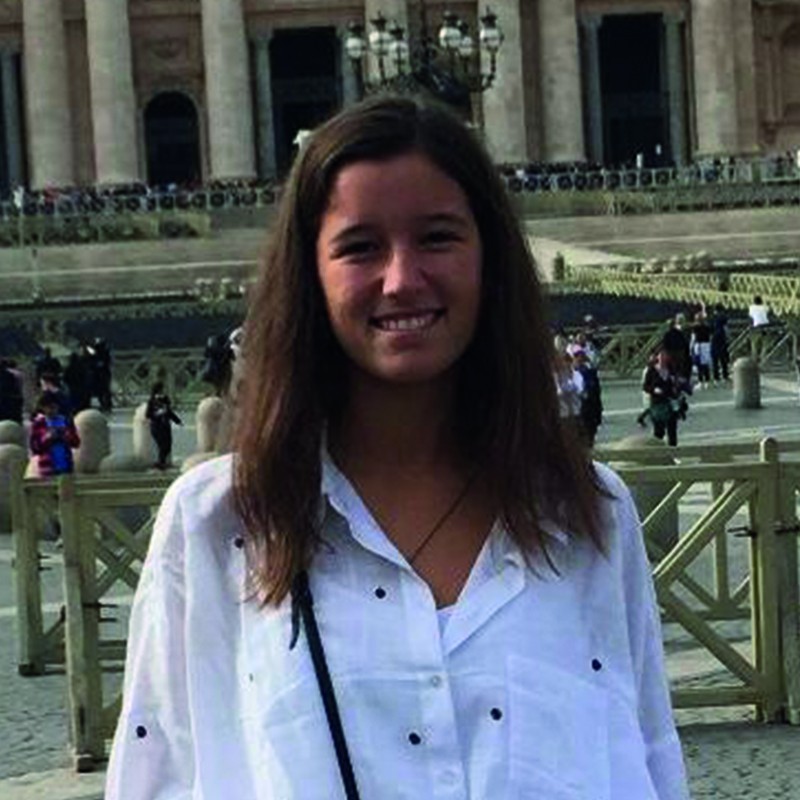
Joana Correia – Year 4 of the IMDM, she was on Italy on an Erasmus mobility
“We don't control what happens to us, but we control how we react”
On 18 February, I went to Rome to do an Erasmus mobility with my friend Carlota, and I should have stayed there until mid-July. Meanwhile, Europe got Covid-19 and today I am another student who attends FMUL's online classes. Classes had not yet started and we were walking around Naples when we received an email from the FMUL Erasmus office saying that students who were in the northern regions of Italy were advised to return to Portugal. At the time, we were left with the feeling that the advice was exaggerated. In Rome, there were very few people wearing masks, everything seemed normal: museums and squares were full of tourists. We followed the news on the mobile phone and realized that in Portugal a more serious scenario was being painted than the one we could see and experience. On 5 March, all universities in Italy were closed for a period of 10 days. Carlota and I had agreed that on the day FMUL advised us to return, we would return without hesitation. And that day came.
At the time, it wasn't the danger of contagion from Covi-19 that scared us. What really worried us was the possibility of missing the semester. This is because we were still unaware (no one knew then) of what was to come, the severity of this virus.
We did not yet know that it was our duty to stay home to curtail the spread. We visited everything we had not yet seen: churches, museums, parks, etc. We felt good and privileged to be able to stroll in that city. However, the scenario changed as the days progressed. The streets started to become empty.
Having made the decision to return to Portugal, we bought airline tickets for 11 March. On the 9th, Monday, we were completely surprised by the announcement of the general quarantine in Italy. Afraid of being stranded, we brought the flight forward to the next day.
I was afraid that the temperature would be measured at the airport and that we would be trapped in Italy if we had fever. I also feared the flights would be cancelled and that we would be unable to return. Everything was changing very fast! Everything was conceivable! I just wanted to get home as soon as possible.
We were lucky to come back, albeit by a whisker. A day later and we would no longer have a direct flight to Portugal.
The Erasmus cancellation posed many questions. Will we have the right to keep the grant? The truth is that we had expenses in excess of its amount and we did not return of our own choice, but for reasons of force majeure. Will the landlord return the deposit? I invested 1 year in Italian courses for nothing? Will it be possible to do the Erasmus mobility next year?
The speed of events meant that, of course, no one knew how to answer all these questions in a timely manner. As time goes by, we have obtained some more information. The truth is, I felt a lot of support from the faculty to try to minimize the inevitable consequences. They always guaranteed that they would place us in a class if we decided to come back, and that they would do everything so that we didn't miss the semester.
The instinct is to feel sad, angry, wronged. But one just has to look around to see really complicated situations to put everything into perspective. One just needs to turn on the television and watch the news. It's knowing what's going on in Italy, for example. It is seeing people dying, families unable to say goodbye properly. I did not have the experience that I could have had and that would surely enrich me, but, after all, how lucky I am! I lost so little...!
What one feels in these situations depends a lot on the personality of each person. As for me, despite the negative impact of Covid-19 on my life (I am not going to live 5 months in Rome as I wanted so much; I am not going to travel all over Italy; I spent a lot of money that I will not get back), I always tried to be positive. Now, more than thinking about what I lost, I want to do my part to address this pandemic that is affecting so many lives.
One day I was told a phrase that fits this situation very well: “We don't control what happens to us, but we control how we react”.
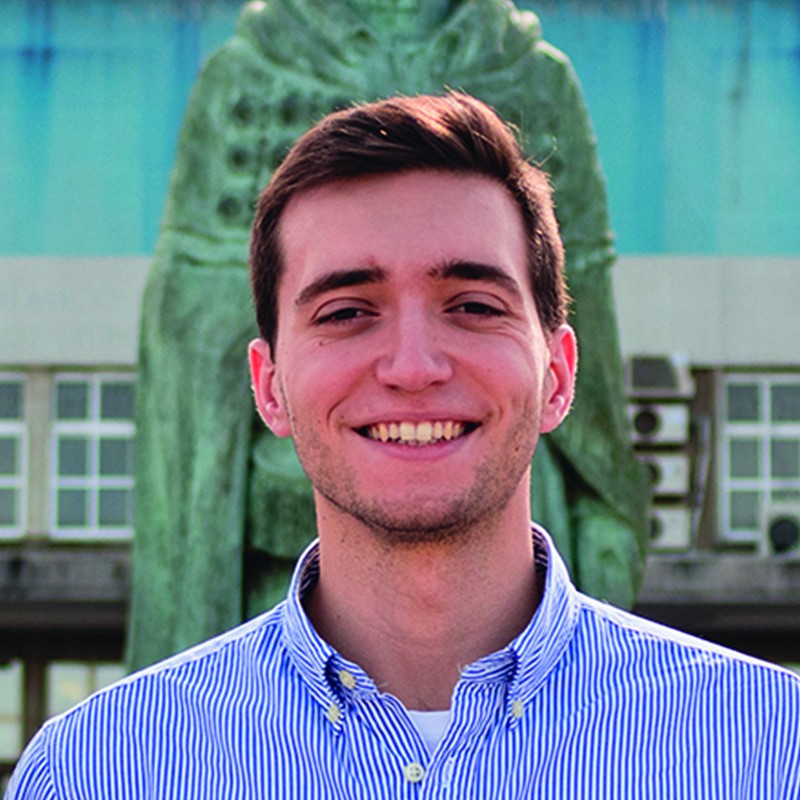
José Pedro Charréu - Year 4 of the IMDM – Professional Fencing Athlete and potential Erasmus mobility in Paris
“I was quarantined on 10 March due to the risk of having contacted an infected patient”
In the beginning of the year, the world awoke to a unique public health threat. A threat that, during the last few weeks, has stopped societies and made humanity reflect.
Despite the estimates and forecasts, the truth is that we are unable to anticipate the impact that this pandemic will have on our future and that uncertainty is undoubtedly disconcerting.
Like Francisco Alexandrino, I was quarantined on 10 March due to the risk of having contacted an infected patient in the IB Medicine service.
I immediately cancelled my registration for a competition in Spain and suspended my fencing training at the club. Moreover, this has been a particularly difficult period for athletes. On the one hand, there is a risk of compromising the work done since the beginning of the season and, on the other, doubts arise regarding the future sports calendar, which has stagnated in the meantime due to the circumstances.
Confined to my home and used to a busy schedule, the quarantine made me redesign my day-to-day life. I improvised a routine sports activity in a corner of the room to maintain some physical activity. I read things that I had planned to read a long time ago. I invest in learning French despite being aware that my Erasmus mobility next year is threatened. The rest of the time is divided between faculty classes in Zoom and time spent with my family. It is said that in times of disaster, great sacrifices are required from the population.
Now, since I am not a fan of inactivity, I see this stay at home as an insignificant suffering, largely justified by its collective importance. "How will the exams be done?", "Will I be able to do an Erasmus mobility next year?", "When will the next competitions be?". These are all relevant and unavoidable issues, however, they are secondary, so I decide to postpone them while waiting impatiently for the situation to be resolved.
As medical students, we often think about achieving a goal and rarely about what it means to achieve it. When we follow the work of the medical community on a daily basis, we must reflect on its role and importance in society, taking advantage of this reflection to recapture our taste for medicine and, above all, to assess what medicine will bring us in the future.

Mariana Quilhó Pereira – Year 4 of the IMDM, possible Erasmus mobility in Munich
“FMUL was able to successfully overcome the problem of classes by resorting to videoconferences, which makes me proud to be part of this institution”
We are currently facing a period unmatched by any that I have seen so far. Humanity has already overcome other health threats, but none has forced the measures now stipulated.
The day-to-day lives of the majority of the Portuguese suffered a sudden turnaround. As a medical student, I was used to a routine of constant bustle, ranging from the faculty to other extracurricular activities like the orchestra, the German course, the gym, and now I feel I was forced to fall into an abyss. This new threat enforced a drastic change in our lives, to which we had to adapt, for the good of all.
I must say that the Faculty of Medicine of the University of Lisbon has successfully managed to overcome this problem and maintain the natural course of classes, in the form of videoconferences. It demonstrated exceptional organization and rapid adaptation to the current pandemic. Undoubtedly a sign of excellence, which makes me proud to be part of this institution.
An unstable period like this makes us think that we are all the same and susceptible and vulnerable to the disease. It puts us in an insecure position of constant uncertainty about our near future. It forces us to distance ourselves from those who are most dear to us. It haunts humanity. However, not everything we face has disadvantages. Our routines are usually lived so intensely, so full of chores, that sometimes prevent us from stopping to interpret what is around us. It is mainly in these moments that we have the humbleness to be able to stop for a moment and think about what really makes us happy, how lucky to have a wide range of opportunities that allow us to evolve every day. At a time when our best contribution is to stay at home, we value the important role of health professionals, which makes me reflect about my future. I hope one day, as a doctor, I will be able to say that I have contributed positively to improving the health status of a population at risk, and that I have been able to do something to help.
Soon, things will get better.
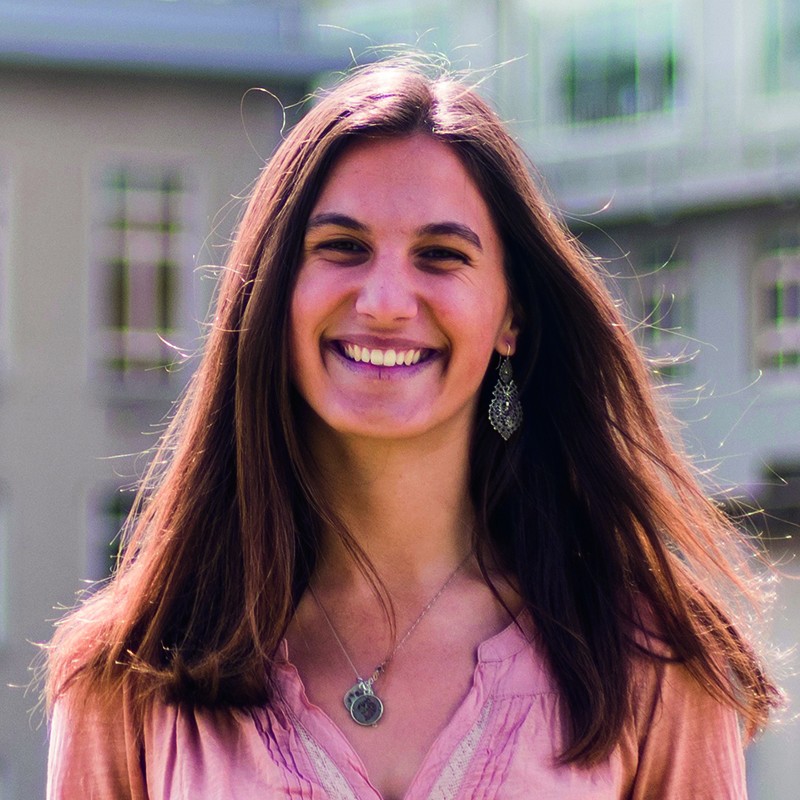
Isabel Ponte – Year 5 of the IMDM, Member of the Cultural Evening Committee
“In the struggle between the rational and the emotional, the latter wins by far and it made me go back to my corner in the Azores”
We are living atypical times. These are times when we want to go back to the routine we complained about so much, ignoring the fact that we would miss it. These are times when we take refuge in electronic devices not out of liking, but out of obligation. These are times when we fear the world around us, due to the uncertainty of the reality we live in and the proportions that this pandemic can take.
For many of us, these are sad times. Several students see their future compromised, even though the Faculty makes all efforts so that we can see a light at the end of the tunnel. Several returned home in doubt as to when it would be possible to see their family again and have the comfort of their home. In my case, in the struggle between the rational and the emotional, the latter won by far and made me return to my corner in the Azores (with due care, of course), although I am confined to the walls of my room and contact with my family is only minimum, in an attempt not to put them at risk.
Several students also saw their projects suspended or cancelled. Projects to which they dedicated themselves wholeheartedly throughout the year, which required sacrifices and whose final result may not be the one they took for granted. The Cultural Evening was one of the projects I was involved in and which, unfortunately, is also “postponed indefinitely”. We are haunted by a feeling of helplessness, but these decisions are beyond us completely.
However, if on the one hand these are times of uncertainty, on the other they are times that made me realize that we have time. In contrast to our hectic daily life, where everything would be “for yesterday”, now we have time. Time to enjoy with the family, even if it is 1 meter away, to tidy up the room (without excuses), to read, to discover a thousand and one things there is to do at home and also take advantage of it. Even though it is not the way we were used to, we have time to talk to our friends and family who are far away, who often fall into oblivion due to the madness of our routines... We have never been so united. Not everything can be bad.
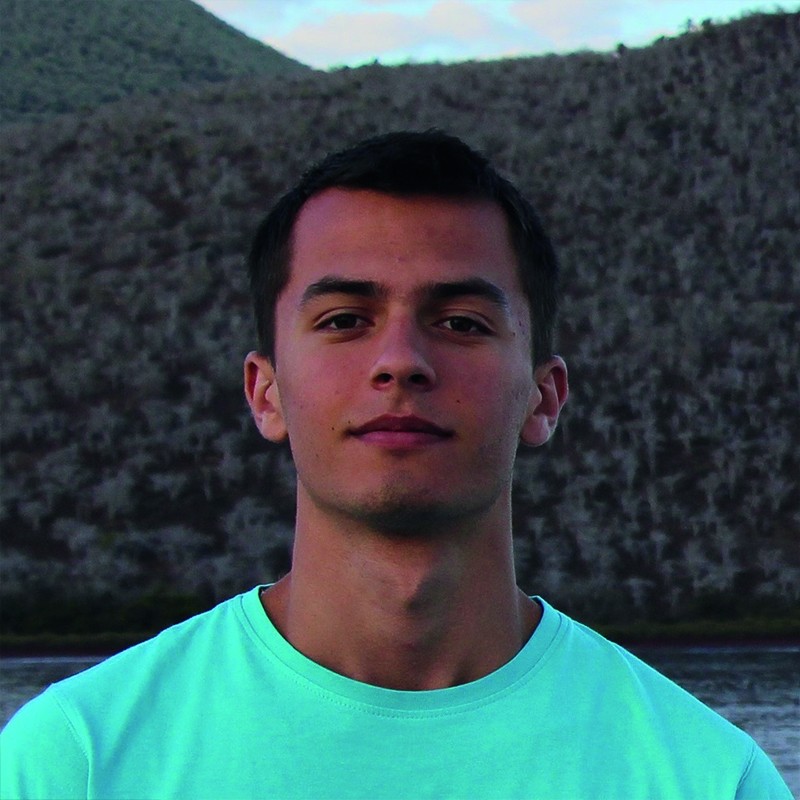
Francisco Alexandrino – Year 4 of the IMDM, member of the scientific coordination committee of the 11th AIMS Meeting
“It is for my grandparents and the most fragile people that I stay at home, everyone should do it to protect their loved ones”
When the Chinese government quarantined the city of Wuhan on 23 January, I never thought that two months later I would be confined at home writing this account. I think neither me nor anyone else.
A major feeling of helplessness prevails in me, probably because I have been quarantined for longer than most people. The first case of COVID-19 at Hospital Santa Maria was that of a patient admitted to the medical service where I had classes with my friend José Pedro, so on 10 March I stayed at home and have not left it since.
Meanwhile, the AIMS meeting has been cancelled, the faculty classes have been suspended, the futsal team training has also been cancelled, the same applying to the sporting and cultural events. In addition to the feeling of powerlessness in the face of this public health problem, I found myself acting as a “pensioner”. I went back to reading books and articles, watching classic films and playing on the computer, that is, I started to do things that I always liked to do, but that often had to be left behind due to the commitments throughout my academic life. From this viewpoint, not all has been bad.
From a distance, I have been in touch with my old, yet very active and stubborn grandparents. My grandfather insisted on continuing his clinical practice and my grandmother persisted in going out often. After my huge insistence, and that of my parents and uncle, they agreed to decrease their social life, which, by the way, was much more active than mine in the last two weeks. It is for my grandparents and for the most fragile people that I stay at home, everyone should do it to protect their loved ones. Saving lives has never been easier, just stay at home, which, regardless of background, everyone can do.
An apparent small outbreak, originating in China, went through dozens of countries until it reached a pandemic state and arrived in our country, Portugal. This small virus took the opposite direction from the one Jorge Álvares took in 1513 to China, becoming the first European to reach the lands of the Middle Kingdom. Despite the fact that the new coronavirus took only 65 days to arrive in Portugal, much less than the several years that our “Hero of the Sea” took in the opposite route, we cannot allow ourselves to give in to fear, as a “brave nation” as ours fight it with science, facts and hope.
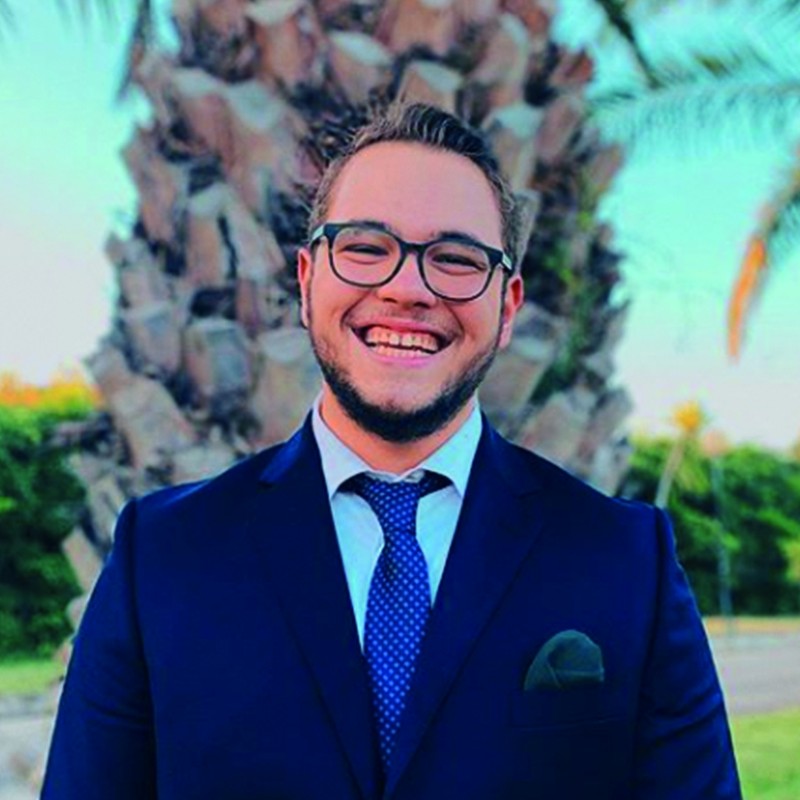
Ricardo Boavida – Year 1 of the IMDM, Year 1 Degree Committee representative
“It took the emergence of a powerful and invisible enemy to make us stop again to think about the fragility of the human condition”
In the hellish race that rules our lives, we have always acted as if we were robots, without really looking at others, carried away by the countless daily chores, and, without thinking twice, we took everything for granted. We follow the routine carefully, govern our lives based on pre-established ideals and priorities, and it seems that everything works perfectly. Until, at the beginning of this year, silent and fuelled by journalistic sensationalism, an enemy appears that is gradually damaging the harmony of the life we lead and jeopardizes everything we have counted on so far. On second thoughts, it took the emergence of a powerful and invisible enemy to make us stop to think again about the fragility of the human condition and to bring about people’s most primitive instincts. Fear. Irresponsibility. Despair. All of these motivate, for example, the hoarding of supermarkets and pharmacies, as we have seen. With this pandemic, we had to change our priorities, and start to question everything that had always proved to be right.
In fact, the influence of all this is undeniable in a newcomer to the academic world, who every day intended to write stories to later remember with colleagues, friends, teachers and family.
Staying at home all day, having classes on the computer, and not being able to be with many of those we like most, is complicated, boring but necessary. We do this so that, in the future, who knows, we can tell all these stories that we are writing to our children or even to our grandchildren. All of this still seems very unreal and very threatening. Without any doubt, COVID-19 will forever mark the way we think and act, making us think, above all, about the incredible ephemerality of life. However, I have no doubt that like all the difficult wars we have fought and won, this will be another one that, in a few months' time, we will be able to conclude and win.
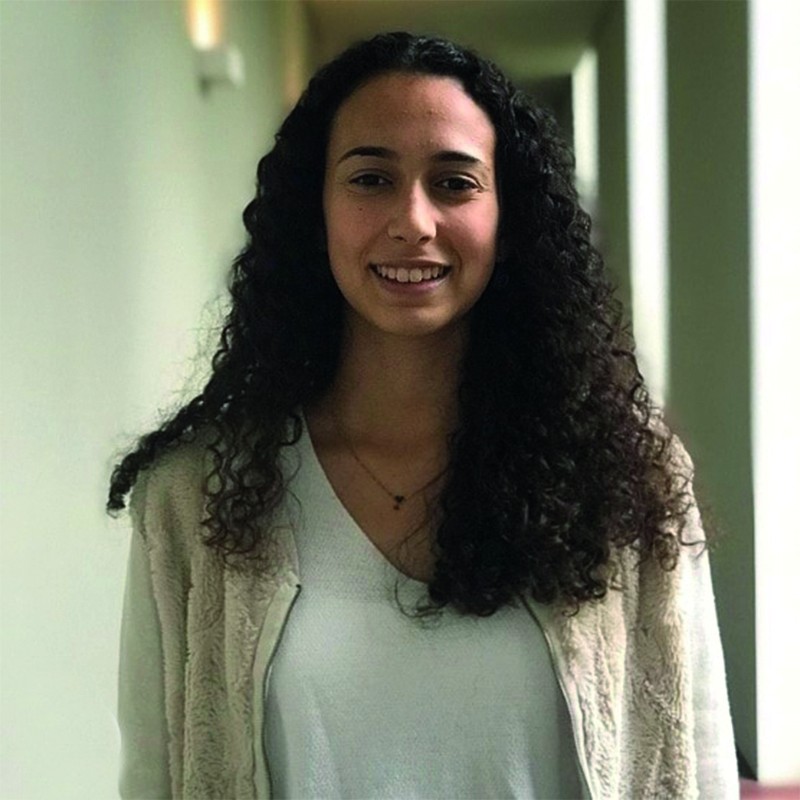
Catarina Domingues – Year 2 of the DNS
“One tries to simulate the closeness that was previously felt by touching, hugging and laughing, but this is only an attempt”
We are facing a war scenario. The streets are empty, there is loneliness and anguish, and instead of gunshots, all the time one watches breaking news, reads reports on social networks and sees tributes at the window, in the hope that better days will come. The combatants fight day and night, with sweat and tears in search of life and health and with all the weapons at their fingertips, even if they are lacking.
For many, like me, it is as if the world has stopped and, now, confined to home, the feeling is of fear of what is yet to come, discouragement because freedom is scarce, boredom at the time that is so slow and, especially missing the routine, the busy days, the faculty, friends, and life.
This social isolation made me appreciate what I myself criticized several times before. Waking up early and doing the morning run not to miss the bus; arriving and sighing with joy at seeing the imposing Santa Maria Hospital sometimes still with the lights on; having lunch together; learning new things; working as a team and then getting home again in the evening; greeting the family that waits for me to have dinner and sleeping, knowing that everything will be repeated the next day. But now everything is different. Each day looks the same, all contacts, classes, meetings, and conversations are done at a distance. One tries to simulate the closeness that was previously felt by touching, hugging and laughing, but it is only an attempt.
From now on, humanity, our country and the world will have learned two major lessons, the appreciation for what we have and the gratitude and recognition that health and all those who contribute to it deserve, doctors, nurses, pharmacists, scientists, and many others who devote their time and life to saving and healing other people’s lives.
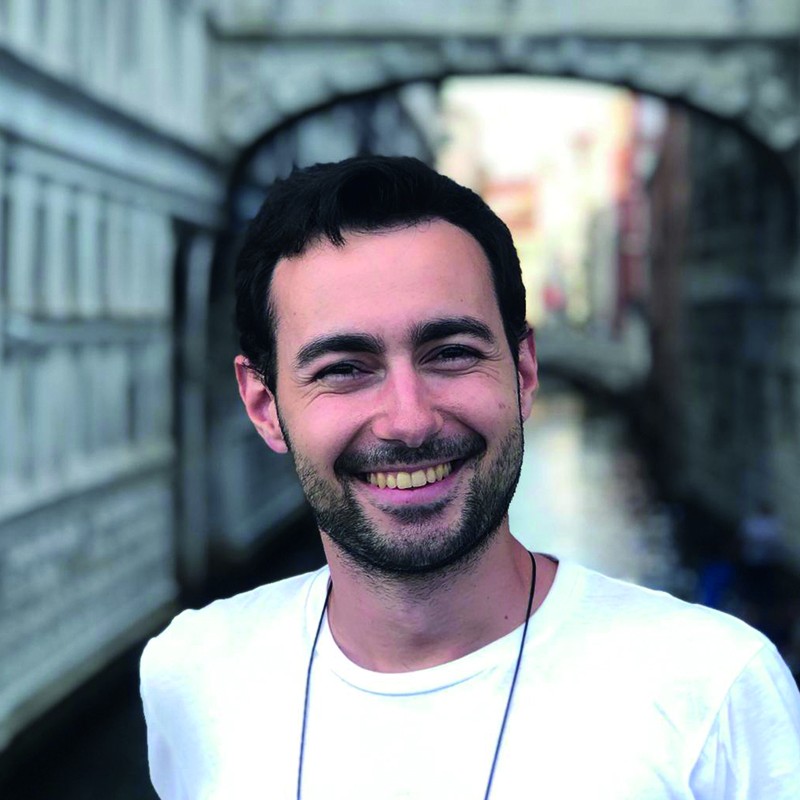
João Torres – Year 6 of the IMDM, hospital internship year
“If before we saw specialist doctors and interns going out of their way to deal with all situations, now I cannot imagine the challenges they face. That's where we're useful, not at home. And it’s hard to contain this urge”
Until recently, my days were split between Hospital Garcia de Orta, where I am interning, studying for the National Exam, doing the Master Degree’s Final Work and, whenever I could, enjoying small moments of leisure.
Right now, I am at home with my parents and my sister. My girlfriend is at home with her family too, and the same goes for my friends. I can only speak with them on the telephone. I get news from the Faculty by email. And from the Hospital, I receive small news from my team via WhatsApp.
Although we know that our presence at home is the right measure, the feeling we have is that it is in the ward that we are needed, now more than anything. If before we saw specialist doctors and interns going out of their way to deal with all situations, now I cannot imagine the challenges they face. That's where we're useful, not at home. And it’s hard to contain this urge.
At the beginning of the outbreak, I felt a certain moral duty to keep updating myself, in order to better inform those around me and avoid spreading wrong and dangerous assumptions. As the epidemic grew, especially in Italy, I began to realize the consequences that it could have. Professionals working beyond the limits of their capabilities, deciding between life and death, without weapons that allow them to do more than that.
Imagining this happening in front of us is scary and makes us doubt what we took for granted. Thus, this concern for the epidemic that was previously a moral obligation is increasingly becoming a burden that generates an anxiety that is difficult to manage. We can't leave the house. We can't help. In all channels, websites and social networks we only talk about Covid-19 and, whenever we dive into the subject too much, we become even more concerned.
It is in this limbo that we spend our days - between taking care of our loved ones, staying at home, vigilant, and waiting to be called to help, as happened in other countries. In between, we spend time watching classes by videoconference, studying and working on the thesis. Waiting for time to pass, waiting to be called.
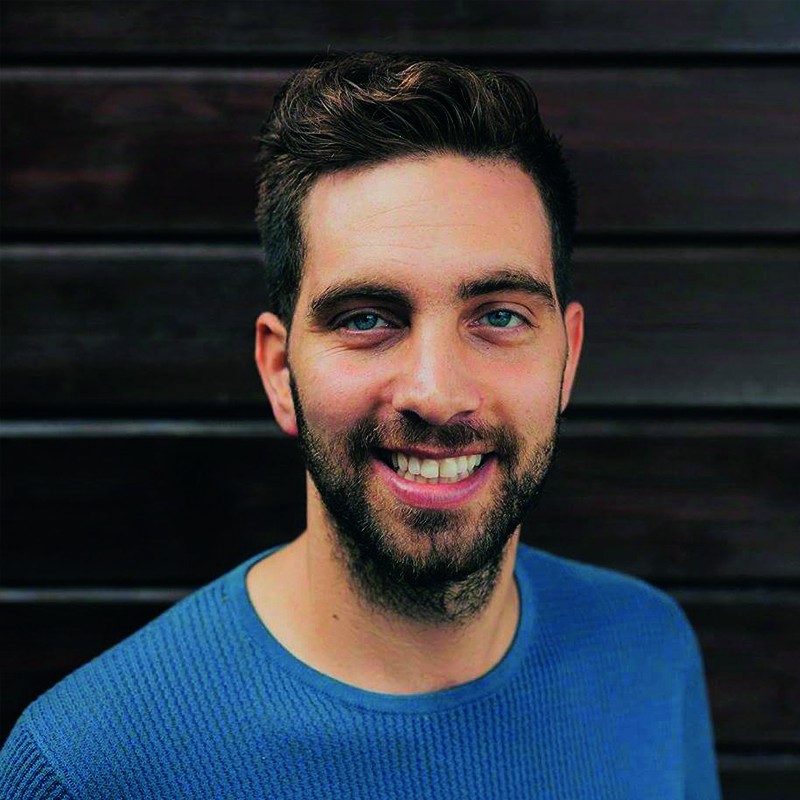
Eddy Martins – Year 2 of the IMDM, Nurse in Primary Health Care and Additional Means of Diagnosis | Telemedicine
“CoVid-19”
We are living through mind-blowing times marked by fear, anguish and uncertainty. These feelings brought us the essence of valuing who we love and the profound consideration of what we were, are and will be.
Never before in the history of the contemporary world have we been asked to be soldiers of an unprecedented war that concerns us all. And we are all called: there is no time or space for race or skin colour, nor for idealism or any kind of excuse for intolerance. Being soldiers has been, between the sword and the wall, a challenge: an appeal to unity without being together, an appeal to brotherhood without holding hands and an appeal to solidarity away from stages that heat up egos instead of the truth.
The superfluous fell apart and we turned the page to think about the things that really matter. We stopped hard and the rush is gone. This is an excellent opportunity to BE, not to HAVE, away from reproachful looks, from the judging mouth and from the distorting ears.
Being a medical student took on a deeper meaning: sweaty skin and hands marked by work; the desire that so many have to jump out of the chair and go to the front. It makes sense to be here.
I am very happy to be part of a year whose hosting of graduates has gained the deserved dimension: crossing experiences and learning opportunities. Having space, in a faculty where everyone dreams, is to be grateful for every opportunity.
All of us, oldies, as we are affectionately known, have come forward. Pharmacists, biologists, nurses and many others: some doing laboratory tests that prove the growth of the pandemic; others are in laboratories looking for answers to fight this battle; others in hospitals seeing the marks of an invisible enemy; and still others making available goods essential for survival.
It hurts a lot leaving home without knowing what time we will return or even if we will return. It hurts even more having to recreate ourselves, to improvise, when the necessary material does not exist. We recreate ourselves in the midst of exhaustion and we cry because we get involved, because we are human when we work in inhuman conditions. It is a war scenario where the enemy is not only the famous and destructive virus, but also the misinformation that leads to panic. And panic means impotence.
Time is running out and empathy is, unfortunately, in the background. We don't have the time, and sometimes the patience, to be bombarded by unfounded questions that clog our virtual or face-to-face services: “My husband came home from work and gave me a kiss: am I infected?”; "I feel hot, I think it's a fever, but I don't have a thermometer!”. Fear leads to selfishness: of those who empty stocks of medicines or essential material for health professionals.
But with each dawn comes the hope of a new day, of a better day... of the day when we will see each other face to face, looking each other in the eyes.
Undoubtedly, Humanity has won over, and may this ordeal that is now distancing us mean that the future embrace gains a new and true meaning.
Thank you FMUL for this opportunity.

Oureana Ferreira - Year 1 of the DNS
“With my parents and brother living abroad (Geneva), I started to feel lost. The request from the government and the faculty was explicit: “Stay at Home!“
On 9 March I received a message from a friend asking if I would have classes, after seeing in the news that the medical schools in the country would close.
I was in class and thought: the news is always exaggerating”. However, after reading an email sent to all FMUL students asking us to stay at home until 27 march, I was amazed. I was not expecting such a “drastic”, albeit necessary, measure.
With so much media information and news from the faculty, I didn't have much time to process and sort out ideas.
Due to the combination of group work (via video call), classes (video call), walking much less (because I stayed at home as requested)... I started to feel “suffocated”. Despite talking on the phone with my family and having my boyfriend with me at meals, I started to feel “lonely”. In fact, with my parents and brother living abroad (Geneva), I started to feel lost. The request from the government and the faculty was explicit: “Stay at Home!"
But where is my home? Should I stay in Lisbon? Is my home to be in a house alone? Or do I feel at home, at someone else's home?
It was initially very difficult for me to adapt to the “quarantine” situation because I didn't know where to go, and, mainly, I didn't know how long I would be in isolation.
My parents repeatedly told me that I should catch a plane immediately and go to them. After much hesitation, I decided not to go. They were coming to Portugal so that we could spend Easter together, and I was going wait until then to see them. Furthermore, I would not be at peace with the possibility of infecting someone or being infected.
However, this idea was not out of my head: “did I make the right decision? ».
The moment when I was most disoriented was when a teacher said that there was a possibility that this situation of isolation could extend far beyond Easter. On about the same day, the announcement of the closure of land borders between Spain and Portugal was made, as well as the limitation of flights to and from the EU. In my mind I just thought: "Am I going or not to my family?", "What if I get infected?", "I feel alone", "should I be rational or emotional?"
I decided to put an end to the dilemma and take a flight HOME.
Ever since I arrived, I feel better. It seems that much of the pressure I felt has disappeared. I feel comforted to be at home, with my parents and brother.
In order not to go crazy, I try, as much as possible, to do activities beyond classes and study. I finally cook some recipes that I have had for months, I go for a walk and run with my brother here in the village, I have dinner with my parents, I train at home, I do volunteer work…
On the one hand, I think it is a difficult situation because we quickly feel alone, not being able to socialize and feeling that we do not have our usual freedom. On the other hand, I see these days/weeks as an opportunity for families to get closer (even with the normal tensions in a house), it is also an opportunity to rest a little longer, read a book, think about life...
I think that in these situations we learn to value things that we considered to be “small”: for example, it is good to wake up in the morning to go to the faculty, even if it is just to meet people and see our friends. We value the fact of having a family, of being able to choose in our everyday life to go for a walk, dine out, go to the gym, or stay at home watching series. Despite the current circumstances that we all live in, I hope that students will find activities, things to do to relax and enjoy time at home, since, in the middle of all this, we must see the small positive side, and wash our hands.


